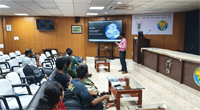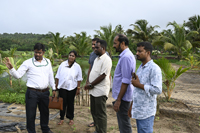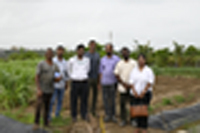
ICAR-CCARI Organizes Industry–Scientist Interface on AI and IoT Applications in Aquaculture
ICAR-CCARI Organizes Industry–Scientist Interface on AI and IoT Applications in Aquaculture
A focused interaction on the integration of Artificial Intelligence (AI), Machine Learning (ML) and Internet of Things (IoT) technologies in aquaculture was convened at ICAR–CCARI on 27th June 2025. The meeting featured representatives from Business Kendra, the developers of BlueTechFins, a real-time water quality monitoring system. Dr. Parveen Kumar, Director of ICAR-CCARI, emphasized the vital role of Artificial Intelligence (AI) and Machine Learning (ML) in transforming agriculture and allied sectors. He stated that the vision of Smart, Climate-Resilient Coastal Agriculture can become a reality by 2047 through the effective integration of these advanced technologies into coastal farming systems. As part of the collaboration, a BlueTechFins unit was installed in one of the institute's aquaculture ponds to demonstrate its operational potential under field conditions. The session was led by Shri Trivesh Mayekar, Scientist (FGB), who highlighted the transformative role of digital technologies in aquaculture, emphasizing applications such as real-time water quality monitoring, biomass estimation, automated feeding, and adaptive water management. He shared examples of global and Indian startups leveraging AI–IoT tools to optimize production, improve sustainability, and support data-driven aquaculture practices. He highlighted need for developing cost effective smart solutions tailored for various aquaculture systems, including cages, pens, wetlands, lakes, and tanks. Dr. Sreekanth emphasized the need to integrate AI, IoT, ML, and other smart systems to develop technologies that are simple, farmer-friendly, ecologically sustainable, and economically viable, especially for resource-poor small and marginal farmers.
The visiting team actively engaged with the scientists, sharing technical perspectives and exploring adaptation strategies for field deployment. The dialogue fostered a deeper understanding of user needs and engineering innovations. Participants also visited a traditional Khazan land aquaculture site, where they were introduced to the unique saline ecosystem and institute-led interventions. Discussions centered on customizing AI–IoT systems for climate-resilient aquaculture in salt-affected and ecologically sensitive areas. The program demonstrated the potential of public–private partnerships in promoting smart aquaculture and was jointly coordinated by Shri Trivesh Mayekar, Dr. Sreekanth G.B., and Mr. Harshvardhan Shetye, ICAR-CCARI.


